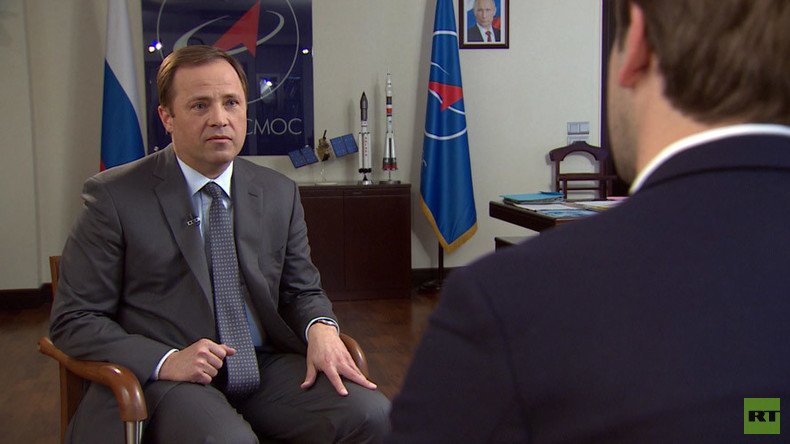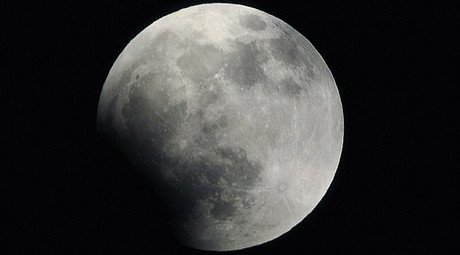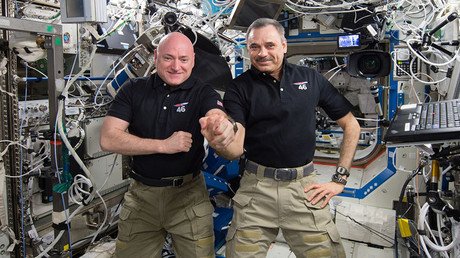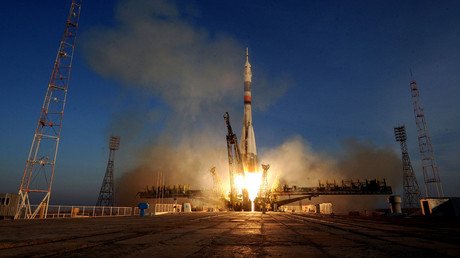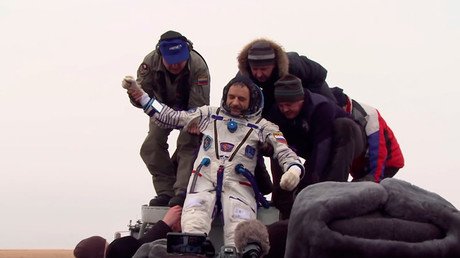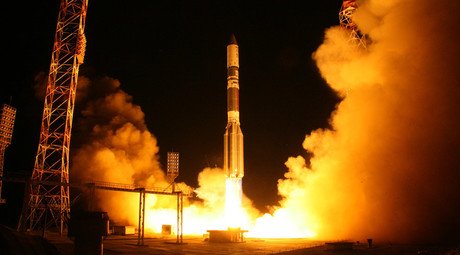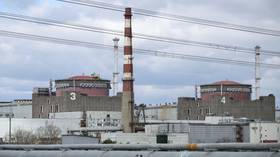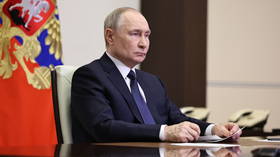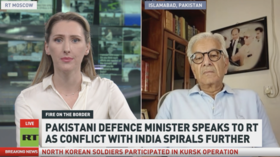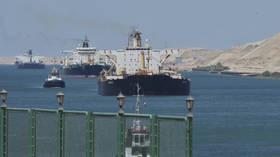‘Looking from outer space, you don't see any borders on Earth’ – Roscosmos head to RT
As Russia and the world celebrate the 55th anniversary of history’s first manned spaceflight made by Yury Gagarin, RT talked to the Director General of Russia’s Roscosmos space agency, who shared details on some exciting, ambitious plans now in the works.
RT: Mr. Komarov, thank you for your time. So, we have some ambitious space expeditions to look forward to in the next 55 years?
Igor Komarov: Hello. Yes, I think we are looking at a lot of progress to be made in the next 55 years, and a lot of exciting developments. That’s a lot of time. I think we will see a mission to Mars, and I think that Russia together with its partners in other countries will set up an orbital station on Mars. I’m sure there will also be a lot of research activity on the Moon, including the creation of a lunar base and a lunar orbital station. By the way, we are already discussing such plans with our partners in NASA and the European Space Agency. The concept of a low-orbit space station, which today is the International Space Station, will also change significantly, assuming an entirely different set of functions, such as the servicing of spacecraft and space tugs, particularly for purposes of traveling to the Moon and to Mars. It will also serve other purposes, hopefully including space tourism.
RT: Let’s start with NASA. The Agency stopped launching its own ships into space at some point, so getting astronauts to the ISS is now exclusively done by Russia. But NASA is planning to resume its own space launches. How much time do you think that might take?
IK: Indeed, Russia is presently the only space power that flies cosmonauts and astronauts to the ISS. Things will stay this way for quite some time. NASA plans to resume its launches in 2019 with spacecraft produced by SpaceX and with Lockheed Martin’s Orion intended for flights to the ISS.
RT: The US also plans to end its dependency on Russian-made space engines. Is there an alternative to Russian hardware?
IK: Well, let’s be honest: they don’t buy our engines out of charity. There is a simple and clear reason, and that is the fact that Russian-made engines are currently the best there are with regards to quality and price. And we are confident that things will stay this way for a few more years. We are open for cooperation: we’ve been supplying our engines to the United States, and we are looking at a number of opportunities this year for signing major contracts with other clients. As for competition, we are seeing serious activity in the United States aimed at upgrading their existing engines, but also developing new designs. For us, this is really an incentive to keep improving our performance and design new engines, rather than rest on our laurels.
RT:Who would you name as Russia’s real competitors in the area of space exploration, if any?
IK: There certainly are. There are areas where Russia is an undisputed leader, particularly launch vehicles and launch services. This is where we are number one by a large margin, administering about 40 percent of all space launches worldwide. We are also number one in the engine market, which you have already mentioned, and in the area of manned space programs. But in other areas, we’ve got room for improvement, and we could certainly learn a thing or two from our competitors in areas such as spacecraft quality, communications, or earth remote sensing systems.
RT:You’ve mentioned flying to Mars. There’s a joint project called ExoMars which looks pretty promising. What is Russia expecting from it? There have been attempts to fly to Mars in the past, with little success. What makes this project likely to succeed?
IK: A successful start, I’d say. In fact, Roscosmos and Russian companies were the ones in charge of some of this project’s most critical phases, namely the launch and orbit insertion for heading to Mars. And we did well. Our Proton-M launch vehicle and booster managed to deliver the orbiter precisely according to its planned flight path. In contrast to some of the earlier setbacks, this one went trouble-free. We find that pretty encouraging. Next, we’re expecting a mid-course maneuver to adjust trajectory in July, and we’re confident that around October 16th our joint mission with the European Space Agency will be able to reach Mars, orbit it, and go operational. The scientists from many nations who have spent the last 10 or 12 years working on this project are certainly looking forward to that, hoping for some profound results.
RT: Let’s talk a little bit about the United States. Moscow and Washington may have their political disputes, but Russian cosmonauts and American astronauts seem to get along just fine onboard the ISS from what we see on social media. Do you think their friendship will endure these troubled times?
IK: I believe it already has. Last year was the 40th anniversary of the Soyuz-Apollo Project, and we had a big celebration for this milestone event. And there I saw Tom Stafford and Alexei Leonov address the audience and share their memories. The level of cooperation and the spirit of collaboration this mission managed to achieve against the background of the Cold War and the highly strained relations between the then-Soviet Union and the United States is truly remarkable.
We also had NASA Administrator Charles Bolden visit Russia for an evaluation of the recently completed ISS year-long mission, and I saw him talk to the cosmonauts and to Sergey Krikalev, with whom he had spent so much time onboard the space station, as well as training and preparing for the mission. And I’ve seen the relations between Mikhail Korniyenko and Scott Kelly after they’d spent a year together at the ISS. And I’m sure this spirit and this relationship will live on. This is a sentiment I’ve seen from cosmonauts who have participated in joint missions, as well as from those who have trained together. And I would say that both space agencies, namely Roscosmos and NASA, also share this attitude. You see, looking from outer space, you don’t see any borders on Earth, and there is an understanding that all our political differences and rivalries are something we should leave down here, rather than drag with us into outer space. Space is a realm we can only explore through joint effort. Therefore we must preserve the relationship we now have.
RT: Do you think private financing will become more significant in the future?
IK: We are seeing that many governments are showing a lot of interest in encouraging private entrepreneurship in space. And we are also supportive of that. We believe private companies have an important role to play in a number of areas related to the production and operation of spacecraft, communications, and ERS services, etc. It’s already a reality, and we should certainly support that. We are seeing some impressive initiatives in the area of launch vehicle production, new companies emerging and giving the market a serious shakeup, and giving it a new impetus to improve performance and efficiency.However, in areas such as deep-space exploration or fundamental scientific research, we probably shouldn’t expect a serious breakthrough from a private investor. That kind of exploration requires the investment of enormous resources, while benefitting science and humanity, as such, rather than any private stakeholder. I don’t expect this kind of research to become profitable in our lifetime, or any time soon. Therefore, government support and government programs for space exploration will remain essential. And we see Russia and other nations continue to provide that.
RT:Presently, all Russian missions are launched from the Baikonur Cosmodrome that Kazakhstan leases to Russia. But at the same time the Vostochny launching facility has been under construction in Russia. When can we expect the first launch from there, and what about the first manned flight?
#ExoMars: Joint Russia/Europe rocket successfully sets off on long journey to Red Planet https://t.co/79bVFF6yBTpic.twitter.com/zs6i255jcr
— RT (@RT_com) March 14, 2016
IK: Indeed, one of the key and most important projects not only for the Russian space industry, but for Russia in general, is the construction of the Vostochny Cosmodrome. We are actively working on preparing the first launch from this facility, sending to space our legendary Soyuz launch vehicle. We plan for it to happen by the end of April. We have ambitious plans to develop this cosmodrome and I think with it lies our future.
RT: Let’s get back to Mars, which is truly the topic of interest. The flight to Mars will take approximately six months. Will it be possible to get there faster by introducing new engines or new technologies?
IK: You are right. Reducing the flight time is one of the tasks we are trying to tackle. Unfortunately, with existing technologies and engines, the journey to Mars takes about six months. There is another reason to develop and improve technologies to make the journey shorter: the space environment is pretty aggressive, it contains high levels of radiation. So reducing the travel time is also important in terms of ensuring that the human body functions properly. If we want to explore faraway planets, engine construction should be given a new boost to make engines perform more efficiently and cut down the time it takes for spacecraft to travel between different orbits.
Russia rejoins space tourism race https://t.co/uQvo2nltdI
— RT (@RT_com) March 9, 2016
RT:The first flight to space 55 years ago was of huge importance for everybody on our planet. But since then, space missions have turned into something kind of routine, a commonplace occurrence. Has the space exploration lost its initial romantic air?
READ MORE: No drama in space! ISS crew members open up about life in orbit (VIDEO)
IK: I think that all the cosmonauts and astronauts who have been to space, those who’ve recently returned or plan to go to orbit, and everybody involved in preparation of space flights, would definitely answer no to your question. It can never become routine, and it has not become routine to this day. As the head of Roscosmos, I am personally involved with all the launches of manned missions to the ISS, and I can tell you that it is a huge responsibility and an extremely complex process, requiring an enormous amount of preparation and training and a great deal of dedication from the crew about to go to space, as well as the people instrumental in making it happen. So I do not see it turning into something routine; maybe in the distant future.
RT:Do children still dream of becoming cosmonauts?
IK: Yes, they do. In my line of work, I’ve learned that many children are happy about the progress we achieve and want to become cosmonauts. It’s kind of like setting a challenge for yourself and paving your way to the future.
RT:Let’s go back to the ISS for a bit. It really is an example of many countries cooperating successfully. How do you envisage the future of the ISS in, say, ten-fifteen years?
IK: I think that in 10 - 15 years the ISS will have undergone significant changes. New goals are being set, so a new set of functions will be needed to accomplish them. Of course, many modules will remain, and we will keep conducting certain experiments, for example, the experiments to determine the effects of zero gravity on the human body. But I believe many things will change due to technological advancements and the new functions the ISS will have to fulfil, which I hope will include the servicing of spacecraft in orbit, servicing and assembly of inter-orbit spacecraft from the modules delivered from the ground, and maybe repairing space tugs, which I think will be developed in the future. If there’s demand, then maybe new segments will be introduced specifically for space tourists.
READ MORE: Russia's Federation spacecraft 3.5 times cheaper than NASA’s SpaceX Dragon
RT:There are high hopes for the heavy-lift Angara space launch vehicle and, as I understand, this will be the rocket to deliver spacecraft to the Moon and to Mars. What stage of development is it at currently?
IK: By the end of February, we drew up the preliminary design of a heavy-lift rocket, the Angara A5V, which looks really promising. It is now being reviewed by all of the relevant research institutes and key organizations in our industry. In the near future – within the next two weeks – Roscosmos’ board will look at the results, and then we’ll start working hard on it to fulfill our promise: that is to launch the Angara A5 rocket from the new cosmodrome by the end of 2021, and a manned mission launch by the end of 2023. We have to complete preparations for lunar missions and A5V by 2025.
RT:Do you watch films about space exploration? How much do they resemble real life?
IK: A fair bit. People who work in the space industry and space programs can naturally find plenty of flaws and gaps in research, but I think we shouldn’t be so nitpicky, because the main thing about those films are the feelings, the ideas, the philosophy and the plot. I believe the most important thing is that a great number of people find them interesting. Sci-fi films certainly differ a lot from what experts deal with in real life, but I’d say that if we compare [them to] the films made 20 or 30 years ago, there’s as much of a difference there as with the technological progress, that is to say, an enormous one. This genre will be developing along with technology, and we can only support that.
RT:What would you like to say to our viewers on this big day?
IK: I would say that they should remember our achievements and proudly look to the future, because the future holds a lot of exciting projects and new achievements when it comes to exploring the Moon and Mars, building new space stations and conducting new experiments. I think new achievements just as great as those recorded in our history and that of Yuri Gagarin lie ahead, and I believe that this is only the beginning.
READFULLTEXT
